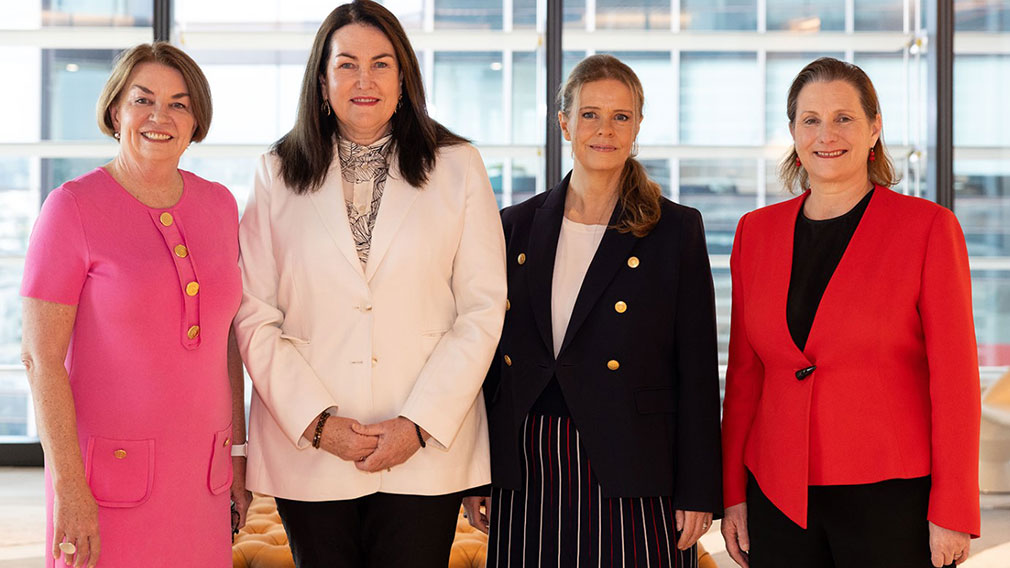Putting the ‘social’ in entrepreneurialism

Leading social entrepreneurs, STREAT CEO Rebecca Scott (left) and Vanguard Laundry’s Luke Terry. (Emma Foster)
Investors and corporates need to evolve their philanthropic support models and lower return expectations if social entrepreneurs are to keep “mopping up” Australia’s biggest social problems, according to the chiefs of two of the sector’s leading social enterprises.
“Social entrepreneurs are the people who go in when a system is broken,” says Bec Scott, chief executive of hospitality social enterprise STREAT. “We go in where there’s not enough cash in the market to make a profit, so others walk out, but we build business models to solve the problem.”
STREAT, which Scott co-founded a decade ago to help young homeless people get off the street, is one of around 20,000 social enterprises registered in Australia tackling social problems, often in areas where government initiatives have been unable to get traction, like mental health.
Although many of these enterprises are relatively small, their impact is large.
At STREAT, more than 1500 young people have been supported and trained across its nine Melbourne-based hospitality businesses, serving meals and coffees to more than 3 million customers. While already making a dent in the number of youths affected by homelessness, estimated at 26,000 each night Australia-wide, Scott has ambitions for the number taken on by STREAT to reach at least 1,095 per year by 2022.
Modelling by RMIT University, using Victorian Department of Treasury and Finance data, has found that STREAT’s intervention has saved the government on average 64 per cent – or $32,495 – annually for every young person referred to them, in reduced health, housing and welfare services costs. This has tallied to more than $16m in government cost savings since 2010. STREAT receives less than 0.7 per cent of its revenue from government sources, and is 70 per cent self-funded.

A trainee at hospitality social enterprise STREAT learning her trade. (Provided)
Community benefits are also flowing from Toowoomba-based Vanguard Laundry Services, a commercial laundry social enterprise set up two years ago by Luke Terry, where people who have experienced mental illness are employed, trained and coached to get back into the workforce.
“In our first seven months of trade we saved the local mental health ward $200,000 in reduced stays,” says Terry, who started Vanguard as an offshoot of the mental health charity he has been running since 2009, Toowoomba Clubhouse.
“We’re showing that people’s medication levels are dropping in half. People are coming off Centrelink payments altogether and 90 per cent of the people we place into jobs are still in the job 52 weeks later.”
But underneath Scott and Terry’s passion and commitment lie bruises from the challenges they’ve faced. Scott, a science communicator at the CSIRO before starting STREAT, says the issues are often more complex than for other entrepreneurs, citing how while social enterprises look just like normal businesses from the outside “they are anything but”.
“My hospitality competitor across the road doesn’t run a job ad that says ‘if you're homeless, you’ve just come out of prison, you’ve got a drug and alcohol addiction, you’ve a mental health issue, and you are absolutely unemployable, you’re our perfect employee’. But we do.
“While you can see the tens of thousands of coffees being made, what you don't see is all the subtleties, effort and cost that goes into the extra relationships, like the 80 referral agencies we work with, to support the journeys of the young people who come through STREAT and for years and years after they go. That requires incredible management skills.”
One of the key challenges is start-up and scale-up funding, partly driven by the lack of “exit” opportunities that provide returns for investors down the track given it often takes at least a decade for social enterprises to break even. Terry believes the greater difficulties in raising capital may be leading people with good ideas to shy away from social entrepreneurialism in favour of more mainstream opportunities.
“We don't have investment funds in Australia to build big social enterprises. The ideas often seem ridiculous – like building a commercial laundry without any laundry experience – so no one wants to put money behind them. The question for social entrepreneurs becomes, ‘how am I going to fund myself, pay my rent?’” he says.
“For Vanguard, we needed 72 funding partners to get the $8 million we ultimately needed to build it. It was really hard. It almost killed me.”

An employee at social enterprise Vanguard Laundry Services. (Provided)
Today, 33,000 kilos of laundry are washed every week at Vanguard, for more than 100 customers including hospitals, hotels and restaurants. It employs 70 people, most of whom had been long-term unemployed due to chronic mental illness and, to date, 14 employees have transitioned out of the laundry and into careers, Terry’s ultimate goal. Due to this success, he’s looking to replicate the model around Australia.
Terry and Scott, both of whom received start-up and scale-up funding from Westpac Foundation, say part of the solution to the financial pressures social entrepreneurs face is getting more corporates to evolve their social responsibility support models, particularly in key areas of finance and investment, procurement and employee volunteering.
While the past decade has seen an uplift in impact investment – funds with flexible terms tied to outcomes – they believe impact investor’s expectations of returns are often “unrealistically high”.
“We get circled by a lot of impact investors who want to be able to come in and make profitable social enterprises. But the reality is that we’re working with some of the most underprivileged people in Australia, in an economy with some of the most expensive award rates in the world,” Terry says.
STREAT, which is “tantalisingly close” to being self-funded, was built using a combination of “heroic” philanthropic funding from overseas, one-off stimulus from the Gillard government, a very generous property purchase, and grants and impact investment. Scott says she doesn’t think she’d be able to get the funding again if she was to do it now.
“Many impact investors are in things like green buildings, where they can get 18 percent. They can't get 18 percent with us. The expectation has been warped and we've got to just get more realistic about what's possible,” says Scott.
Aside from funding, another real game-changer for social entrepreneurs is in corporate’s buying decisions. By actively sourcing products or services from social enterprises, particularly using long-term contracts at commercial rates, corporates can help those businesses to thrive.
Terry says Vanguard was sparked by a nine-year “anchor contract” to do the laundry for Toowoomba’s local private hospital, St.Vincent’s. The hospital’s CEO had decided to outsource its laundry requirements and told Terry he’d give him the contract, if he could raise the money needed to build the facilities.
“We need courageous procurement teams like that,” he says. “Because the idea of giving a local mental health non-profit a nine year anchor contract for a laundry when they've never washed in a laundry before would scare the hell out of most people.”
Scott says STREAT is also benefiting from growing interest in social procurement, and calls out the new framework adopted by the Victorian government which has led to 35 state government departments and agencies now procuring catering services from STREAT, equating to 10 per cent of its catering revenue last financial year.
Both Scott and Terry, considered by many of their peers as pioneers of the social enterprise sector, are determined to play a role in helping eliminate some of the barriers they faced when building their businesses. Terry is in early discussions with Westpac, Minter Ellison and others about a concept called White Box that he expects to be ready early this year.
“The idea is to create an establishment entity that can build more social enterprises and get more procurement opportunities, as a way of funding people, like me in the early days, to go and build these things,” he says.
“The social enterprise sector needs to grow, but we need more resources. Philanthropy will not be able to match the needs. We need backing from both government and the corporate sector.”
STREAT and Vanguard Laundry have received funding from Westpac Foundation and finance from Westpac. Luke Terry is also a Westpac Social Change Fellow. Westpac Foundation’s major focus, as outlined in its 2018 Impact Report (PDF 4MB), is on funding social enterprises with a goal to create more than 10,000 jobs for vulnerable Australians over 10 years. Westpac's commitment to increase supply chain opportunities for social enterprises is outlined in its Supplier Inclusion and Diversity Policy.





